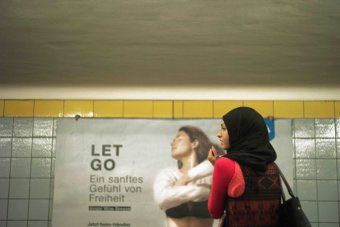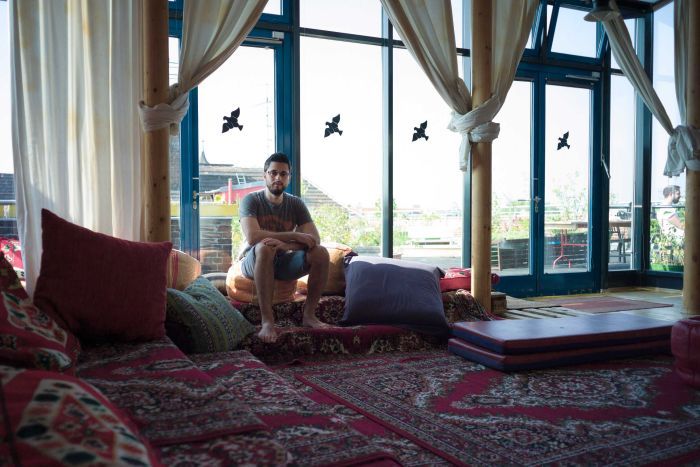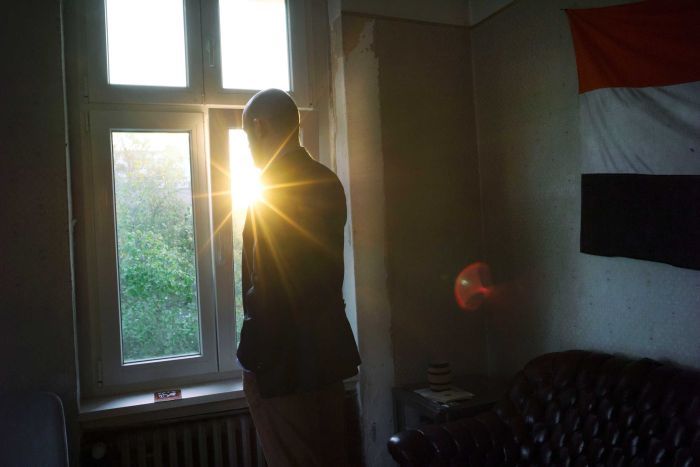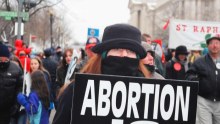Germany, a culture in crisis: Refugees, fear, and a totalitarian past
Updated
Germany, a culture in crisis
Refugees, fear, and a totalitarian past
 Photo:
Germany opened its doors to refugees but has seen a surge in support for the anti-immigration Alternative for Germany party. (ABC News: Christopher Bobyn)
Photo:
Germany opened its doors to refugees but has seen a surge in support for the anti-immigration Alternative for Germany party. (ABC News: Christopher Bobyn)
Once dubbed the "most powerful woman in the world", Chancellor Angela Merkel is reaping a bitter political reward after announcing Germany's "Open Door" to a million refugees last year.
Her party suffered a drubbing in recent state parliamentary elections, while the surging anti-immigration Alternative for Germany (AfD) snared its first seats in Berlin's Parliament.
Photojournalist Christopher Bobyn takes a sounding on the ground in Europe's biggest economy, where the shock of Berlin's election result is still resonating internationally.
"Can we do this?"
"Wir schaffen das," or "we can do this", was Ms Merkel's call to action when Germany faced a massive influx of refugees last year.
Now with over a million refugees, and more arriving daily, the mantra for many Germans has become a series of questions — should we do this; can we afford this; are we safe; and can so many Muslims truly integrate into German society?
Ultimately, Germans are asking: "Who are we now?"
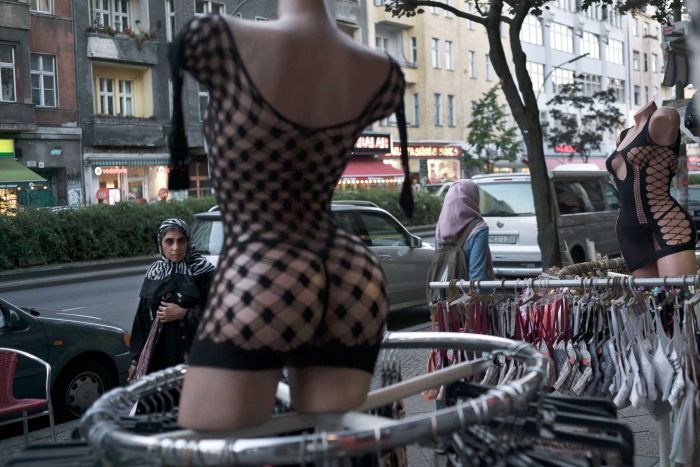 Photo:
A Muslim woman looks at a sex shop mannequin. Muslim women's clothing has become a signifier, for many in Germany, of creeping Islamic extremism. (ABC News: Christopher Bobyn)
Photo:
A Muslim woman looks at a sex shop mannequin. Muslim women's clothing has become a signifier, for many in Germany, of creeping Islamic extremism. (ABC News: Christopher Bobyn)
Two recent terror attacks by refugees have prompted calls for burqa bans, increased surveillance, and for army conscription to be reintroduced — unthinkable measures, even a year ago.
It's a crisis exposing deep social divisions, and a rising tide of German nationalism. Refugees are edgy.
The refugee
Alaa Taan, 22, is a medical student from Damascus in Syria.
He fled after police imprisoned and tortured him for a month without charges.
"I was put in a tiny room, blindfolded and beaten. The first question they asked, after eight days was, 'What is your name?'" he says.
Without any connection to the rebels, Alaa claims he was targeted to intimidate the intelligentsia in Damascus, and show them "President Assad is still all-powerful".
 Photo:
Alaa Taan, a Syrian medical student, fled his home country after being imprisoned and tortured for a month without charges. (ABC News: Christopher Bobyn)
Photo:
Alaa Taan, a Syrian medical student, fled his home country after being imprisoned and tortured for a month without charges. (ABC News: Christopher Bobyn)
At a Berlin cafe, Alaa speaks of the realities of that life, far removed from the hipsters around him.
"Living or being shot depended on the mood of the guard. If he had a bad day, you'd have a bad day too, you could be killed," he says.
 Photo:
"This was the last photo I took in Damascus with my friends, the night I fled for the Turkish border," says Alaa. (ABC News: Christopher Bobyn)
Photo:
"This was the last photo I took in Damascus with my friends, the night I fled for the Turkish border," says Alaa. (ABC News: Christopher Bobyn)
Alaa arrived in Germany last November, after trudging through the Balkans and onward.
He then began a journey through the bureaucracy that he still navigates, hoping to resume his medical studies.
"I want to study and work as a doctor. I can offer something to Germany. But they keep changing the language rules," he says.
Deliberately switching from English to German, Alaa continues, "First I needed level B1 German. I achieved that, only for them to say I now need B2, but I can now work in a restaurant if I want."
 Photo:
Alaa helps a fellow Syrian refugee who cannot speak German to find his way in the Berlin subway system. (ABC News: Christopher Bobyn)
Photo:
Alaa helps a fellow Syrian refugee who cannot speak German to find his way in the Berlin subway system. (ABC News: Christopher Bobyn)
Thankful for the help he's received, he is disheartened by the xenophobia he experiences.
"I will never be treated as a German, or even as a doctor, always as a Muslim. Germans see refugees only as Muslims," he says.
He's troubled by growing anti-refugee attitudes, and resents being treated like a second-class person.
"I want to say something, but I'm not allowed. I'm just a 'shitty' refugee," he says.
The candidate
Joerg Sobolewski, 26, is a well-travelled law student who speaks fluent English and does not fit the image drawn by his opponents — of being a neo-Nazi.
He used to lean to the left in politics, and proudly voted for the liberal establishment party, SPD. Not anymore.
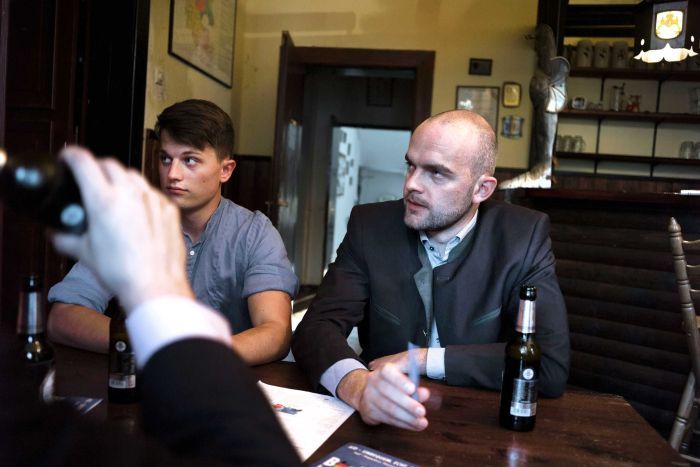 Photo:
Joerg Sobolewski meets his campaign team in his fraternity house, a staunchly conservative men's fencing club, with traditional links to Bismarck's German Empire. (ABC News: Christopher Bobyn)
Photo:
Joerg Sobolewski meets his campaign team in his fraternity house, a staunchly conservative men's fencing club, with traditional links to Bismarck's German Empire. (ABC News: Christopher Bobyn)
Concerns over the Islamisation of German culture, and the threat of lost freedoms, pulled him to the hard political right.
"I don't want my girlfriend to have to wear a burqa if she goes into a Muslim area of Berlin," he explains.
"We have a culture in Germany of strong female leaders and also Freikorperkultur (nude beaches). We should celebrate that."
Joerg stood as a candidate for the nationalist Alternative for Germany (AfD) at last weekend's Berlin state elections. The party has burgeoned in three years from the political fringe to mainstream competition for Ms Merkel's Christian Democrat Party.
"As a conservative German and patriot, I've been waiting for this moment and this kind of party," Joerg beams.
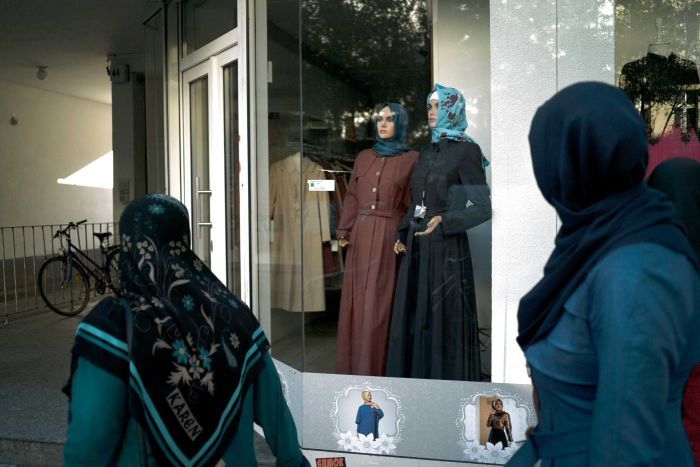 Photo:
Women shopping in Berlin. The Hijab has long been debated in Germany and some politicians are calling for an official Burqa ban. (ABC News: Christopher Bobyn)
Photo:
Women shopping in Berlin. The Hijab has long been debated in Germany and some politicians are calling for an official Burqa ban. (ABC News: Christopher Bobyn)
Joerg didn't win a seat this time, but he scored over 10 per cent of the vote in his riding, and sees it as a signal of victories to come.
His young party emerged from a failure in Germany — after Nazism and the Second World War — to articulate a healthy conservative philosophy.
The AfD is now filling the hole in Germany's political spectrum, with a platform dominated by security concerns and the limits it wants on Muslim refugees, communities, and Mosques.
"If you break our laws, if you rape our women, we'll send you back," he says, echoing a party policy.
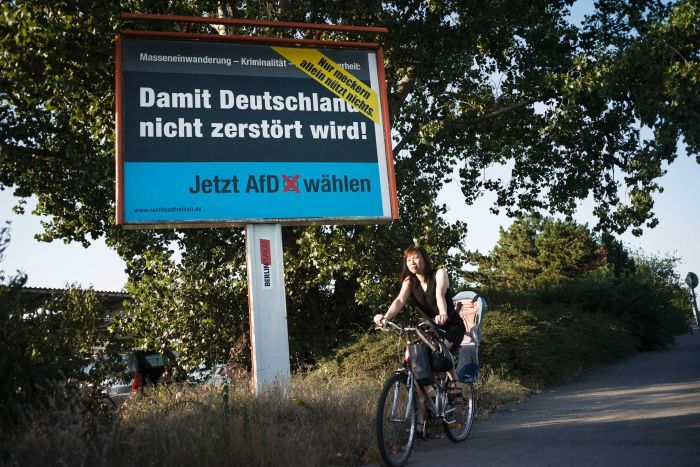 Photo:
AfD campaign poster that proposes to stop immigration, "So that Germany won't be destroyed!" (ABC News: Christopher Bobyn)
Photo:
AfD campaign poster that proposes to stop immigration, "So that Germany won't be destroyed!" (ABC News: Christopher Bobyn)
"We have no tradition of immigration like Australia or North America. And we're asking if that's the country we want? Liberals have dominated the conversation until now, but their opinion is wrong."
With the AfD's recent results, it seems growing numbers of Germans agree.
 Photo:
Jorg Sobolewski and an AfD colleague on the campaign trail in East Berlin. "Under communism, being a fascist was a symbol of rebellion, that's why the east still votes right wing." (ABC News: Christopher Bobyn)
Photo:
Jorg Sobolewski and an AfD colleague on the campaign trail in East Berlin. "Under communism, being a fascist was a symbol of rebellion, that's why the east still votes right wing." (ABC News: Christopher Bobyn)
Bridging the gap
It is the task of two Muslim German police officers to help bridge the divide between refugees and the society they are entering.
Officers Husahm Najjar and Ozgur Aktas, of Arabic and Turkish decent respectively, manage the Intercultural Unit of Berlin's police department.
Their small four-person team is attempting to smooth the integration of the estimated 100,000 refugees in the German capital.
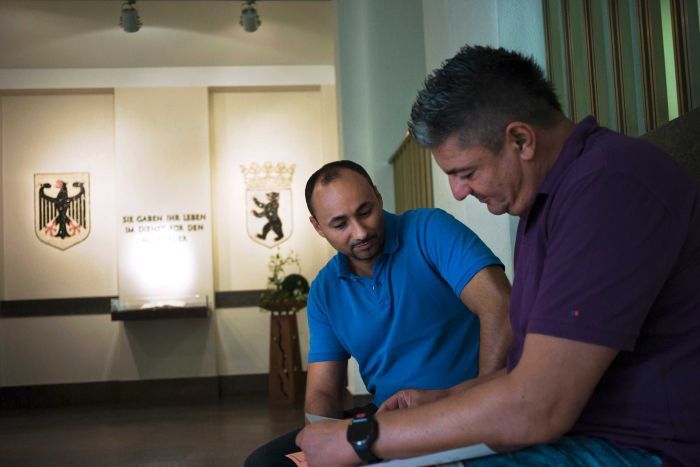 Photo:
Officers Aktas (left) and Najjar (right) review notes in the former Nazi airport where they develop some of Europe's most important urban immigration and refugee policies. (ABC News: Christopher Bobyn)
Photo:
Officers Aktas (left) and Najjar (right) review notes in the former Nazi airport where they develop some of Europe's most important urban immigration and refugee policies. (ABC News: Christopher Bobyn)
From the old Nazi-built Tempelhof Airport, they are doing it 7,000 people at a time.
"The Government wanted to house 30,000 in the airport," explain the officers.
"We immediately said, 'No way, that number will overwhelm the area'. We got them down to 7,000, a number that can be integrated."
The old hangars house the refugees when they first arrive, and they are given information about German laws and customs.
 Photo:
A refugee child runs past officers Najjar and Akta, and a social worker, at the Tempelhof Airport refugee camp. They wear civilian clothing so they can approach refugees who are frightened of police. (ABC News: Christopher Bobyn)
Photo:
A refugee child runs past officers Najjar and Akta, and a social worker, at the Tempelhof Airport refugee camp. They wear civilian clothing so they can approach refugees who are frightened of police. (ABC News: Christopher Bobyn)
The scale of the job is daunting.
"One year ago, there was no master plan. So many refugees arrived so quickly, our first task was to communicate with migrants who spoke only Arabic or were illiterate," explains Officer Aktas.
"We were literally designing and drawing symbols ourselves to explain complex laws, or who to call when you're sick — images that have now become the standard," he adds.
"Now we're advising rural regions, and even hosted a delegation from Iceland."
The eyes of politicians and security experts are focused on the officers' results, as they begin to ease the refugees into Berlin's suburbs.
"We know that the key is to spread out refugees so their kids go to school with German children and learn the language," explain the officers, as they patrol the airport camp.
Officer Najjar warns: "Otherwise it could be another vicious cycle of creating isolated ethnic ghettos."
Cheek by jowl
Berlin's district of Neukoelln is a notorious symbol of failed integration. Turkish and Arab immigrants, attracted by work opportunities, settled here from the 1960s.
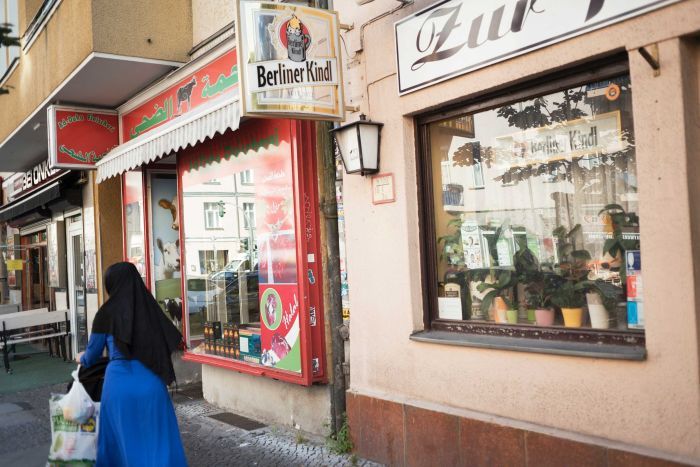 Photo:
A woman passes by the Ad Buhda Halal butcher and Zur Pinte pub, neighbours with divergent customers and customs. (ABC News: Christopher Bobyn)
Photo:
A woman passes by the Ad Buhda Halal butcher and Zur Pinte pub, neighbours with divergent customers and customs. (ABC News: Christopher Bobyn)
Now there is a stark and simmering social divide.
In bustling Fuldastrasse, for example, the Ad Duha Halal butchery trades beside a classic German pub, Zur Pinte.
 Photo:
Storeowner and affirmed German resident Josef at work in his Halal butcher shop, in the heart of Berlin's Neukoelln. (ABC News: Christopher Bobyn)
Photo:
Storeowner and affirmed German resident Josef at work in his Halal butcher shop, in the heart of Berlin's Neukoelln. (ABC News: Christopher Bobyn)
Butcher Josef is originally from Palestine and has been serving meats to the local Muslim community for 11 years.
"I just want to work, pay my taxes and not worry about politics," he says.
"My kids have German passports, and speak better German than Arabic. After 11 years here, if you ask me, I'm German."
It is not a view shared on the other side of Josef's wall.
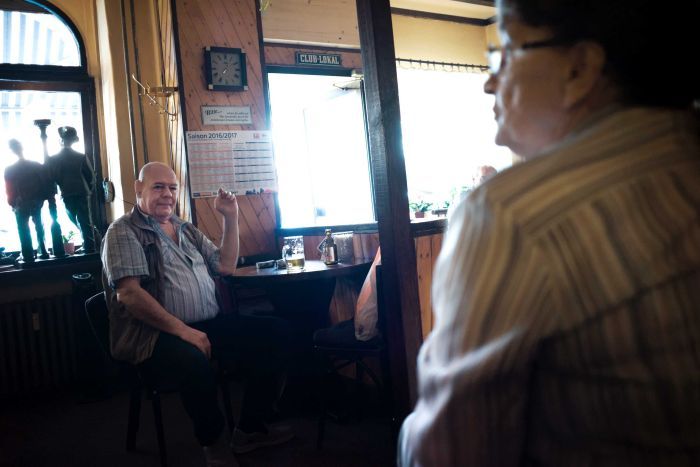 Photo:
Bar patron Klaus: "Not all Muslims are bad, but honestly you can count all the good Muslims on one hand." (ABC News: Christopher Bobyn)
Photo:
Bar patron Klaus: "Not all Muslims are bad, but honestly you can count all the good Muslims on one hand." (ABC News: Christopher Bobyn)
Inside the pub next door, the patrons are angry, and feel like outsiders in their own neighbourhood.
"You could say we're a little island of Germany in here now," laments Barabara, the pub's owner for 14 years.
"I don't recognise the place outside the door."
Klaus, 66, puts it more bluntly: "I hate Muslims. And I didn't used to, but they made me. They won't respect our culture. That's why I voted for AfD."
The experiment
Only a few blocks away, a different neighbourly experience is underway.
Refugio is a shared housing project, home to 40 people: 20 Germans and 20 refugees. So far it is successfully integrating new and old residents of diverse backgrounds.
It was launched last year by the City Mission of Berlin's Evangelical Church.
Eyad, 23, a Syrian refugee, sums up his new home.
"This place changed me after all the hardship. It's made me happier and given me a future," he says.
Maria, 21, takes time from her psychology studies to volunteer, and helps renovate the century-old building.
"The reality is, even among friends, many people are scared of refugees," she says.
"We are the most prosperous and happy generation of Germans, ever. Many young people see the refugees putting that prosperity at risk."
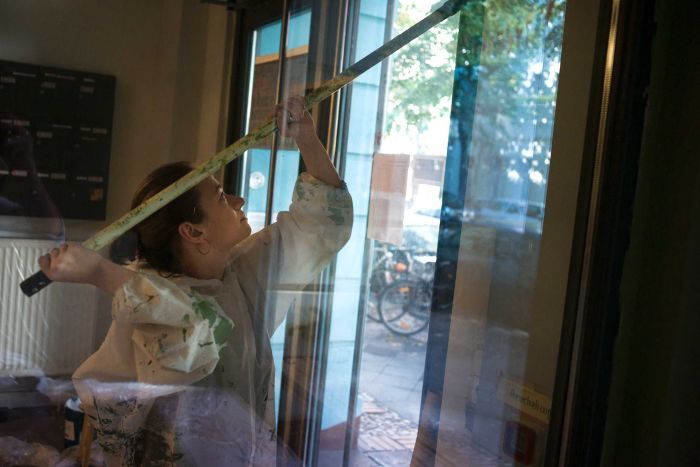 Photo:
Volunteer Maria paints the new entrance at Refugio. She worries about her generation's ability to cope with the refugee crisis. (ABC News: Christopher Bobyn)
Photo:
Volunteer Maria paints the new entrance at Refugio. She worries about her generation's ability to cope with the refugee crisis. (ABC News: Christopher Bobyn)
Putting down her paint roller, she laments, "I'm scared of what's happening with German politics. That's my real fear."
Defining moment
In an environment of anxiety and insecurity, the AfD is on a roll.
After a series of other regional gains, the party won 14.2 per cent of the vote in Berlin's election. The AfD landed 25 seats, and will sit for the first time in the regional Parliament of the German capital. Emboldened, it's predicting solid results in next year's national elections.
Ms Merkel's CDP achieved its worst ever result, at 17 per cent. The Chancellor has accepted responsibility for her party's failure — the party won so few seats, it will not even be part of Berlin's governing coalition.
Such results are rocking Germany's liberal foundations to the core, and raising international concerns over political stability.
From his fraternity house, Joerg Sobolewski strikes a defiant tone.
"It's going to be bad times ahead for Mrs Merkel," he says.
"No-one took the old right wing parties seriously. But now we are a real threat to established politics."
Across town, a fraternity of a different sort gathers. Alaa and his two roommates, also refugees, are preparing dinner for the Muslim festival of Eid al-Adha.
 Photo:
Alaa and his roommates prepare to celebrate Eid al-Adha together, in their north Berlin flat. (ABC News: Christopher Bobyn)
Photo:
Alaa and his roommates prepare to celebrate Eid al-Adha together, in their north Berlin flat. (ABC News: Christopher Bobyn)
Talk turns to the local election and the AfD, when Alaa speaks up.
"The irony is that in Damascus, Muslims, Jews and Christians have all lived together for 2,000 years. I think it's the Germans who can't live with others."
Refugio volunteer Maria worries about the path her country will follow.
"The refugee crisis is going to define my generation in Germany. Unfortunately, I can't say that it will be define us for the better," she says.
Credits
- Reporting and photography: Christopher Bobyn
- Commissioning editor: Deb Richards
Topics: community-and-society, immigration, refugees, world-politics, germany
First posted


